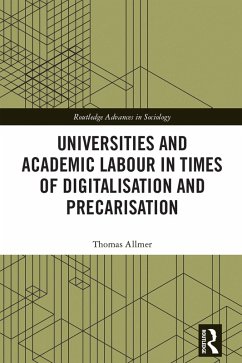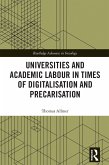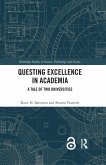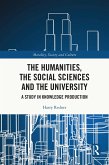Thomas Allmer
Universities and Academic Labour in Times of Digitalisation and Precarisation (eBook, PDF)
43,95 €
43,95 €
inkl. MwSt.
Sofort per Download lieferbar

22 °P sammeln
43,95 €
Als Download kaufen

43,95 €
inkl. MwSt.
Sofort per Download lieferbar

22 °P sammeln
Jetzt verschenken
Alle Infos zum eBook verschenken
43,95 €
inkl. MwSt.
Sofort per Download lieferbar
Alle Infos zum eBook verschenken

22 °P sammeln
Thomas Allmer
Universities and Academic Labour in Times of Digitalisation and Precarisation (eBook, PDF)
- Format: PDF
- Merkliste
- Auf die Merkliste
- Bewerten Bewerten
- Teilen
- Produkt teilen
- Produkterinnerung
- Produkterinnerung

Bitte loggen Sie sich zunächst in Ihr Kundenkonto ein oder registrieren Sie sich bei
bücher.de, um das eBook-Abo tolino select nutzen zu können.
Hier können Sie sich einloggen
Hier können Sie sich einloggen
Sie sind bereits eingeloggt. Klicken Sie auf 2. tolino select Abo, um fortzufahren.

Bitte loggen Sie sich zunächst in Ihr Kundenkonto ein oder registrieren Sie sich bei bücher.de, um das eBook-Abo tolino select nutzen zu können.
This book provides a critical perspective on the digitalisation of universities and precarisation of academic labour.
- Geräte: PC
- mit Kopierschutz
- eBook Hilfe
Andere Kunden interessierten sich auch für
![Universities and Academic Labour in Times of Digitalisation and Precarisation (eBook, ePUB) Universities and Academic Labour in Times of Digitalisation and Precarisation (eBook, ePUB)]() Thomas AllmerUniversities and Academic Labour in Times of Digitalisation and Precarisation (eBook, ePUB)43,95 €
Thomas AllmerUniversities and Academic Labour in Times of Digitalisation and Precarisation (eBook, ePUB)43,95 €![Questing Excellence in Academia (eBook, PDF) Questing Excellence in Academia (eBook, PDF)]() Knut H. SørensenQuesting Excellence in Academia (eBook, PDF)0,99 €
Knut H. SørensenQuesting Excellence in Academia (eBook, PDF)0,99 €![Crossing Borders in University Learning and Teaching (eBook, PDF) Crossing Borders in University Learning and Teaching (eBook, PDF)]() Jane SpiroCrossing Borders in University Learning and Teaching (eBook, PDF)26,95 €
Jane SpiroCrossing Borders in University Learning and Teaching (eBook, PDF)26,95 €![Elite Universities and the Making of Privilege (eBook, PDF) Elite Universities and the Making of Privilege (eBook, PDF)]() Kalwant BhopalElite Universities and the Making of Privilege (eBook, PDF)36,95 €
Kalwant BhopalElite Universities and the Making of Privilege (eBook, PDF)36,95 €![Academia versus the World Outside (eBook, PDF) Academia versus the World Outside (eBook, PDF)]() Bruce FlemingAcademia versus the World Outside (eBook, PDF)41,95 €
Bruce FlemingAcademia versus the World Outside (eBook, PDF)41,95 €![What is Academic Freedom? (eBook, PDF) What is Academic Freedom? (eBook, PDF)]() Daniel GordonWhat is Academic Freedom? (eBook, PDF)0,99 €
Daniel GordonWhat is Academic Freedom? (eBook, PDF)0,99 €![The Humanities, the Social Sciences and the University (eBook, PDF) The Humanities, the Social Sciences and the University (eBook, PDF)]() Harry RednerThe Humanities, the Social Sciences and the University (eBook, PDF)41,95 €
Harry RednerThe Humanities, the Social Sciences and the University (eBook, PDF)41,95 €-
-
-
This book provides a critical perspective on the digitalisation of universities and precarisation of academic labour.
Dieser Download kann aus rechtlichen Gründen nur mit Rechnungsadresse in A, B, BG, CY, CZ, D, DK, EW, E, FIN, F, GR, HR, H, IRL, I, LT, L, LR, M, NL, PL, P, R, S, SLO, SK ausgeliefert werden.
Produktdetails
- Produktdetails
- Verlag: Taylor & Francis
- Seitenzahl: 144
- Erscheinungstermin: 8. September 2023
- Englisch
- ISBN-13: 9781000936858
- Artikelnr.: 68429185
- Verlag: Taylor & Francis
- Seitenzahl: 144
- Erscheinungstermin: 8. September 2023
- Englisch
- ISBN-13: 9781000936858
- Artikelnr.: 68429185
- Herstellerkennzeichnung Die Herstellerinformationen sind derzeit nicht verfügbar.
Thomas Allmer is a research associate in the Department of Media Studies at Paderborn University in Germany. He is also the coordinator of Research Network 18 - Sociology of Communications and Media Research of the European Sociological Association and a co-editor of the open-access journal tripleC: Communication, Capitalism & Critique. His research and teaching are grounded in critical social theory and the political economy of media and communication, with a special focus on digital media and digital labour. His publications include Towards a Critical Theory of Surveillance in Informational Capitalism (2012), Critical Theory and Social Media: Between Emancipation and Commodification (2015) and Academic Labour, Digital Media and Capitalism (co-edited with Ergin Bulut, 2018). Website: http:// thomasallmer.net/
Introduction; PART I: British Academic Labour; 1. British Academic Labour, Digital Media and Capitalism; 2. Precarious, Always-on and Flexible: How Temporarily Employed Staff Experience the Working Conditions at UK Universities; PART II: German Academic Labour; 3. German Universities and Academic Labour between Neofeudalism and Neoliberalism; 4. Interview with Kerem Schamberger about Occupational Bans, Left-Wing Communication Studies and Critique of German Academia; Conclusion
Introduction
PART I: British Academic Labour
1. British Academic Labour, Digital Media and Capitalism
2. Precarious, Always-on and Flexible: How Temporarily Employed Staff Experience the Working Conditions at UK Universities
PART II: German Academic Labour
3. German Universities and Academic Labour between Neofeudalism and Neoliberalism
4. Interview with Kerem Schamberger about Occupational Bans, Left-Wing Communication Studies and Critique of German Academia
Conclusion
PART I: British Academic Labour
1. British Academic Labour, Digital Media and Capitalism
2. Precarious, Always-on and Flexible: How Temporarily Employed Staff Experience the Working Conditions at UK Universities
PART II: German Academic Labour
3. German Universities and Academic Labour between Neofeudalism and Neoliberalism
4. Interview with Kerem Schamberger about Occupational Bans, Left-Wing Communication Studies and Critique of German Academia
Conclusion
Introduction; PART I: British Academic Labour; 1. British Academic Labour, Digital Media and Capitalism; 2. Precarious, Always-on and Flexible: How Temporarily Employed Staff Experience the Working Conditions at UK Universities; PART II: German Academic Labour; 3. German Universities and Academic Labour between Neofeudalism and Neoliberalism; 4. Interview with Kerem Schamberger about Occupational Bans, Left-Wing Communication Studies and Critique of German Academia; Conclusion
Introduction
PART I: British Academic Labour
1. British Academic Labour, Digital Media and Capitalism
2. Precarious, Always-on and Flexible: How Temporarily Employed Staff Experience the Working Conditions at UK Universities
PART II: German Academic Labour
3. German Universities and Academic Labour between Neofeudalism and Neoliberalism
4. Interview with Kerem Schamberger about Occupational Bans, Left-Wing Communication Studies and Critique of German Academia
Conclusion
PART I: British Academic Labour
1. British Academic Labour, Digital Media and Capitalism
2. Precarious, Always-on and Flexible: How Temporarily Employed Staff Experience the Working Conditions at UK Universities
PART II: German Academic Labour
3. German Universities and Academic Labour between Neofeudalism and Neoliberalism
4. Interview with Kerem Schamberger about Occupational Bans, Left-Wing Communication Studies and Critique of German Academia
Conclusion







